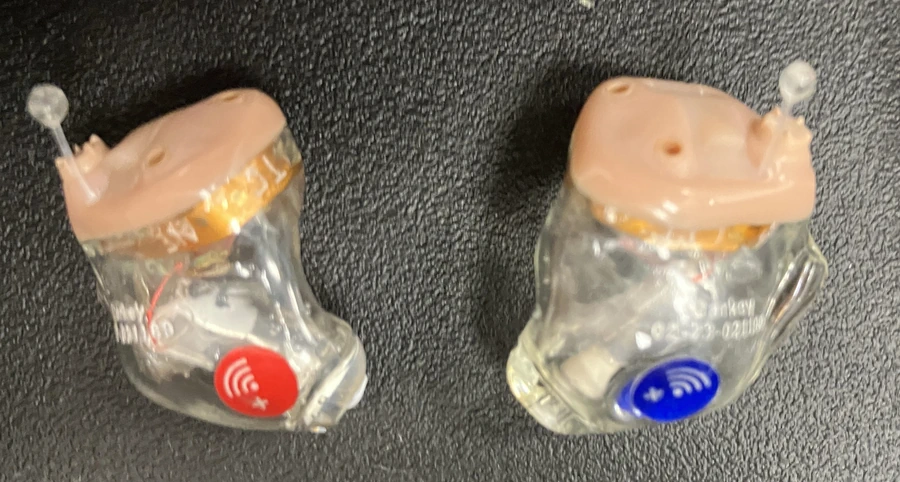Promoting Quality of Life through Improved Hearing Care
Hearing health plays a crucial role in maintaining independence, emotional well-being, and social connection for seniors in nursing homes or assisted living facilities. Ensuring proper hearing aid care and communication strategies can greatly enhance a resident’s quality of life, prevent isolation, and reduce cognitive decline risks. This guide provides practical tips for families, caregivers, and staff members to improve hearing care for residents.
Tips for Hearing Aid Care in Nursing Homes or Assisted Living

- Label the Hearing Aids Cases and Supplies: Use bold, easy-to-read labels to prevent mix-ups. When ordering hearing aids, ask your audiologist to engrave the patient’s last name directly on the hearing aid shell.
- Pick the Correct Hearing Aid: Choose models designed for older adults. See my recommendation for the best hearing aids for seniors.
- Establish Nighttime Storage: Assign a consistent storage location, such as a labeled hearing aid charger or case, and ensure both residents and staff know where to place them each night.
- Consider a Cord and Clip: Use a hearing aid retention cord to prevent loss — especially helpful for residents in memory care units.
- Provide Safety Devices: Install vibrating alarm clocks, flashing smoke detectors, or doorbell signalers to enhance safety for residents with hearing loss.
- Mask Awareness: Educate staff that masks can pull hearing aids out when removed. Train them to handle masks carefully.
- Regular Maintenance: Clean hearing aids weekly and replace wax traps every 2–4 weeks. If family support isn’t available, train staff to do this.
Communicating with Nursing Home Staff About Hearing Aids
- Schedule a Care Meeting: Clearly outline the resident’s abilities, such as whether they can insert aids themselves or need assistance.
- Provide Educational Materials: Share guides and quick-reference cards with staff on cleaning, battery charging, and troubleshooting.
- Advocate for Staff Training: Encourage facilities to include hearing aid care in their training programs, just as they do for medication management.
Strategies to Promote Effective Hearing Care
- Regular Hearing Tests: Arrange annual hearing evaluations and quarterly hearing aid checks with a licensed audiologist.
- Ensure Hearing Aid Access: Discuss hearing aid needs with healthcare providers and provide evidence of their benefits for cognitive and emotional health.
- Document Care Instructions: Give staff a written copy of hearing aid settings, troubleshooting steps, and audiologist contact details.
- Communication Strategies: Encourage staff to use visual cues, maintain eye contact, and reduce background noise during conversations.
- Promote Social Engagement: Plan activities that include captions, visual elements, and inclusive participation.
Common Challenges in Nursing Homes
- Lack of Staff Awareness: Many caregivers are unaware of the high prevalence of hearing loss among older adults.
- Missed Screenings: Hearing assessments are not always part of standard health check protocols.
- Communication Barriers: Poor hearing care can cause misunderstandings and frustration between residents and staff.
- Environmental Noise: Background noise in common areas can make communication difficult for hearing aid users.
Consequences of Neglecting Hearing Loss
- Social Isolation: Hearing loss can lead to withdrawal from social activities, increasing loneliness and depression.
- Cognitive Decline: Research shows untreated hearing loss increases dementia risk.
- Reduced Safety: Inability to hear alarms, announcements, or warnings can put residents at risk.
Hearing aids play a vital role in maintaining communication and connection for nursing home residents. To learn more about navigating daily hearing challenges in different settings, see our Living with Hearing Aids guide.
FAQs on Hearing Aid Care in Nursing Homes
Q: How often should hearing aids be checked in a nursing home?
A: Ideally, hearing aids should be cleaned weekly, wax guards replaced every 2–4 weeks, and professionally checked every three months.
Q: Can staff be trained to handle hearing aids?
A: Yes. Many facilities include hearing aid handling in caregiver orientation programs — but family members should still monitor care.
Q: What’s the best hearing aid style for nursing home residents?
A: Custom in-the-ear hearing aids are less likely to fall out, but rechargeable behind-the-ear models with retention cords also work well.

